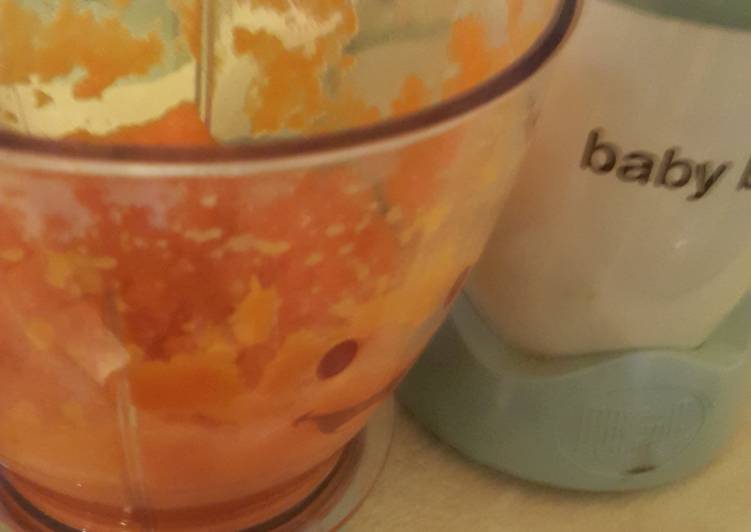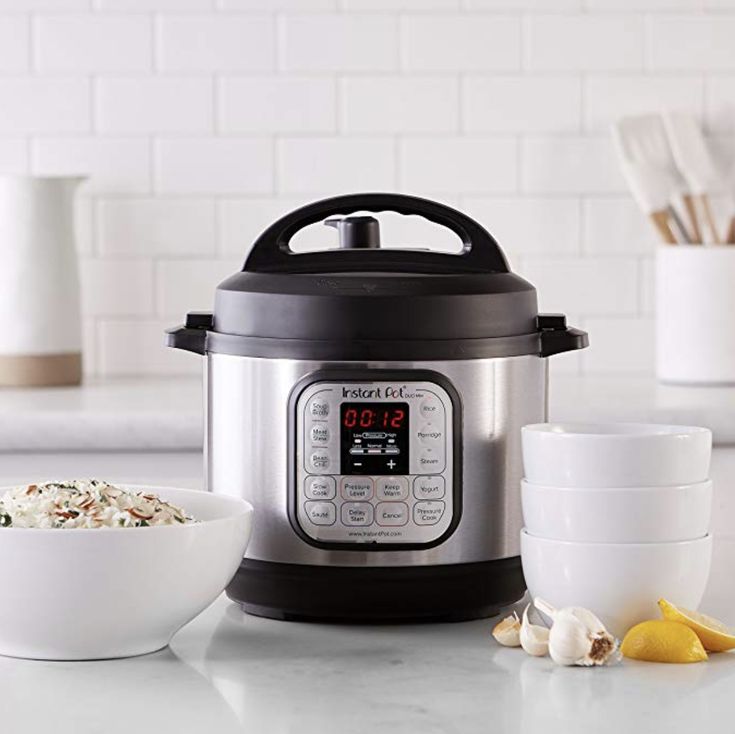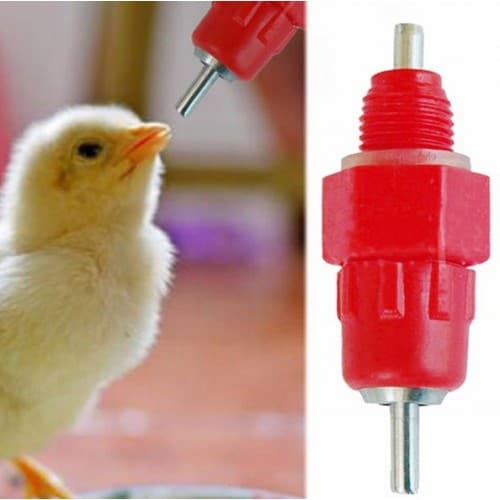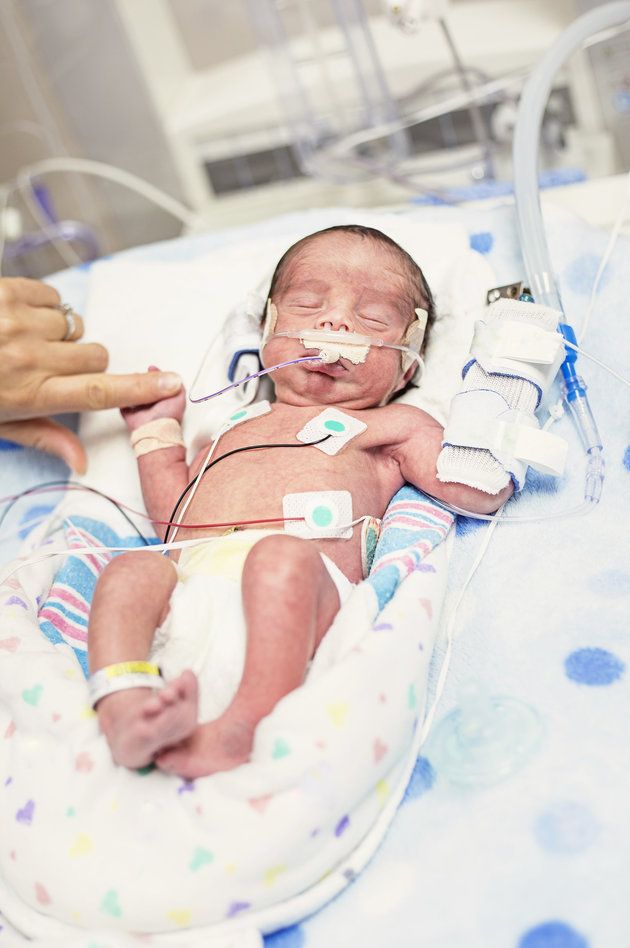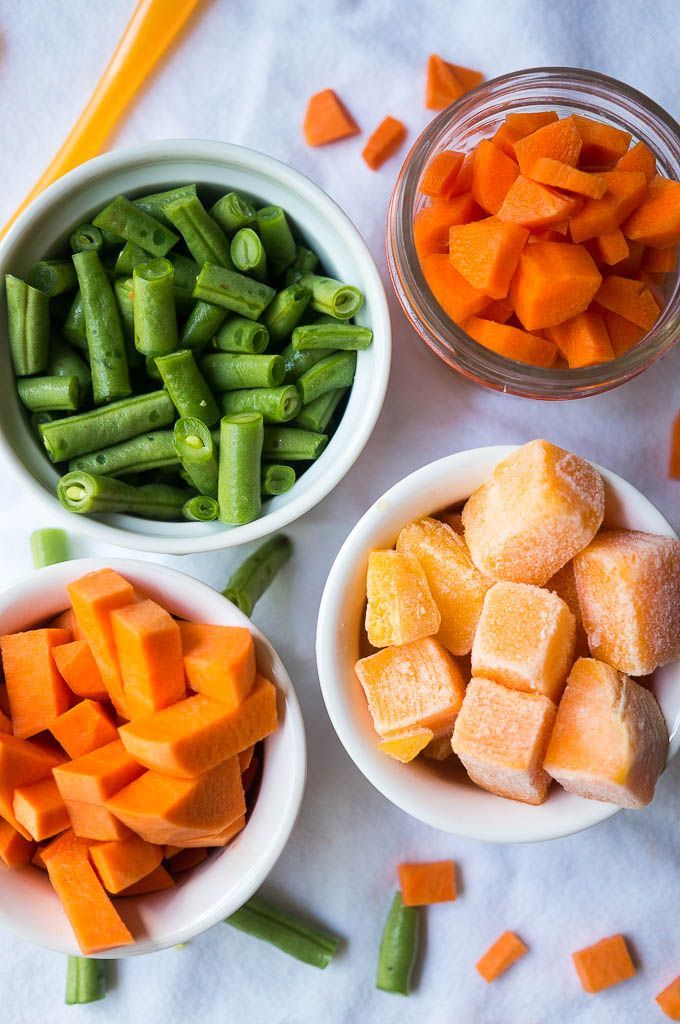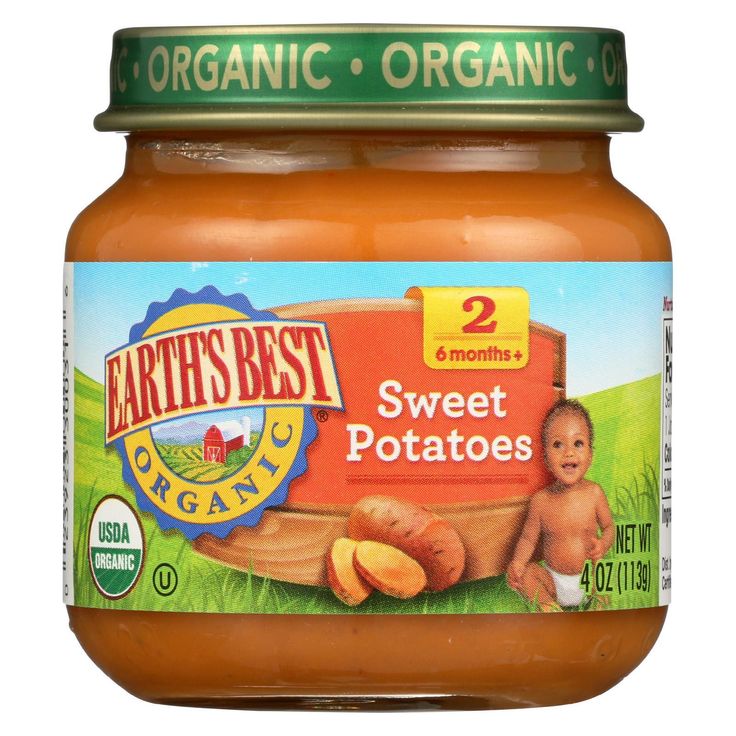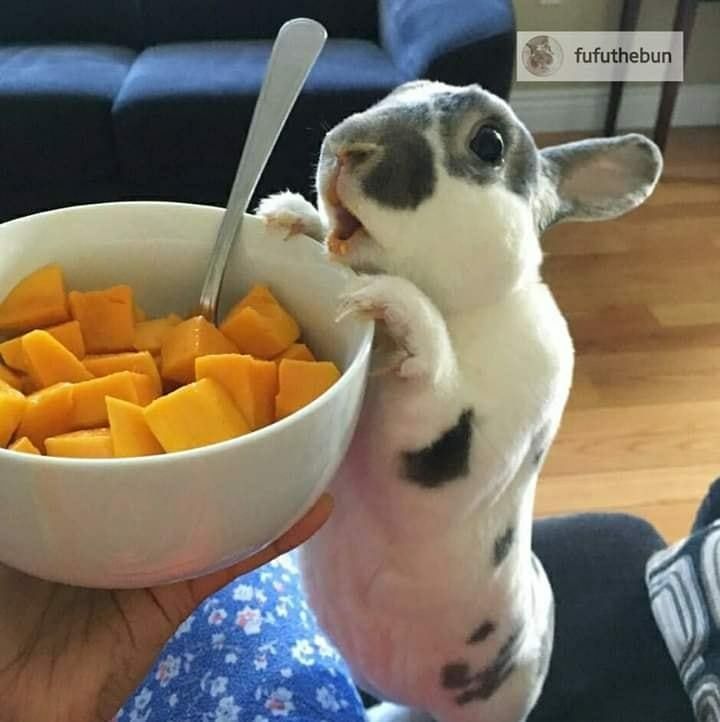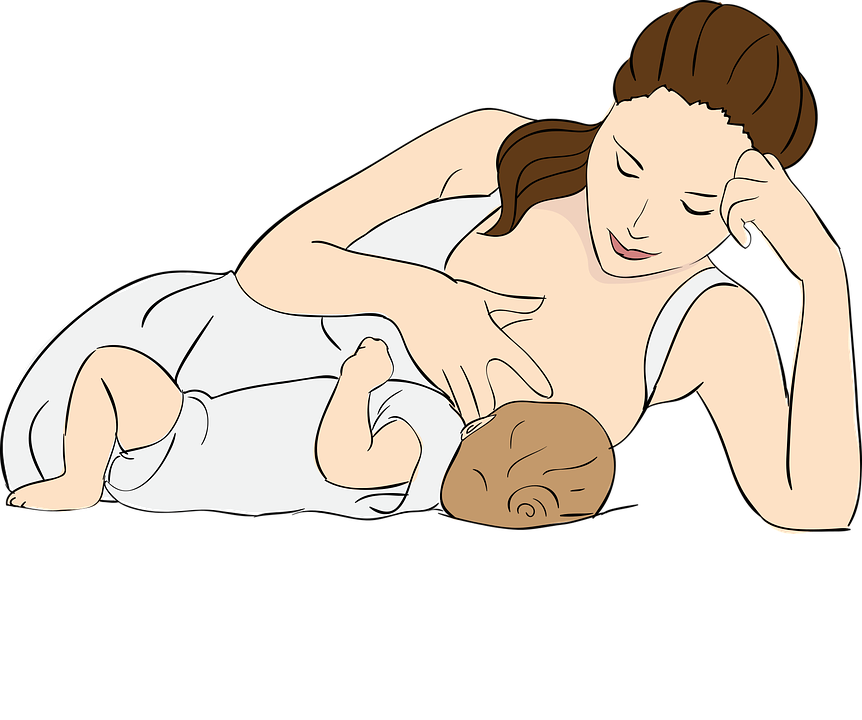How to prepare carrots for baby food
Puree Carrots For Baby Recipe
Published: by Dora · This post may contain affiliate links ·
Sharing is caring!
This puree carrots for baby recipe is a great stage 1 baby food recipe that can be made in 3 ways and served either as carrot puree, carrot mash and baby-led weaning for your 6 month old baby or older. Only 5 min prep.
*This post has been reviewed by Dora Babic-Cikos, PhD Nutritional Science
Ingredients and nutrition
- Ingredient: this is a stage 1 baby food puree so we will just use 1 ingredient - a carrot (for carrot puree combinations scroll to the bottom)
- Type: you can use any type of carrot you like, including baby carrots or even antioxidant rich purple carrots
- Nutrition: it will depend on what type of carrots you use, but the majority are full of carotenoids, antioxidants that have been found to protect from cancer.
Carrots mostly contain water and complex carbohydrates (and fiber) and are a low glycemic index food, meaning they don't spike up the blood sugar like processed carbs
- How to store carrots: unwashed carrots keep at room temperature for a week or so, or a little longer in the fridge. If you want them to last longer then wash, peel, and submerge in cold water to store in the fridge for up to 3 weeks
How to cook carrots for baby recipe?
There are 3 methods to make carrot puree for babies: steaming, boiling and roasting.
Steaming retains the most nutrients, followed by roasting and then boiling. Most of the beneficial nutrients found in carrots are water-soluble meaning that they are released into the water while cooking. That's why roasting and steaming are far better options than cooking.
TIP: If you want to try out baby-led weaning in addition to puree, scroll below to find instructions on how to prepare and serve baby-led weaning carrots.
Method 1: How to steam carrots for puree?
- Trim the tops, peel, wash the carrots and cut them into chunks.
- Place water in a saucepan. Once boiling place the carrots in a steamer basket on top, cover and steam for about 15 minutes until soft. Retain the water from steaming for the puree.
- Transfer the carrots to a blender, food processor or Vitamix and blend. Add water tablespoon by tablespoon until you reach the desired consistency.
Method 2: How long to boil carrots for baby food?
- Trim the tops, peel, wash the carrots and cut them into chunks.
- Place water in a saucepan. Once boiling add the carrots, cover, turn the heat to medium and cook for about 15 minutes until tender.
- Transfer the carrots to a blender, food processor or Vitamix and blend. Add water tablespoon by tablespoon until you reach the desired consistency.
Method 3: Roasted carrot baby food
- Preheat oven to 400°F / 200°C.
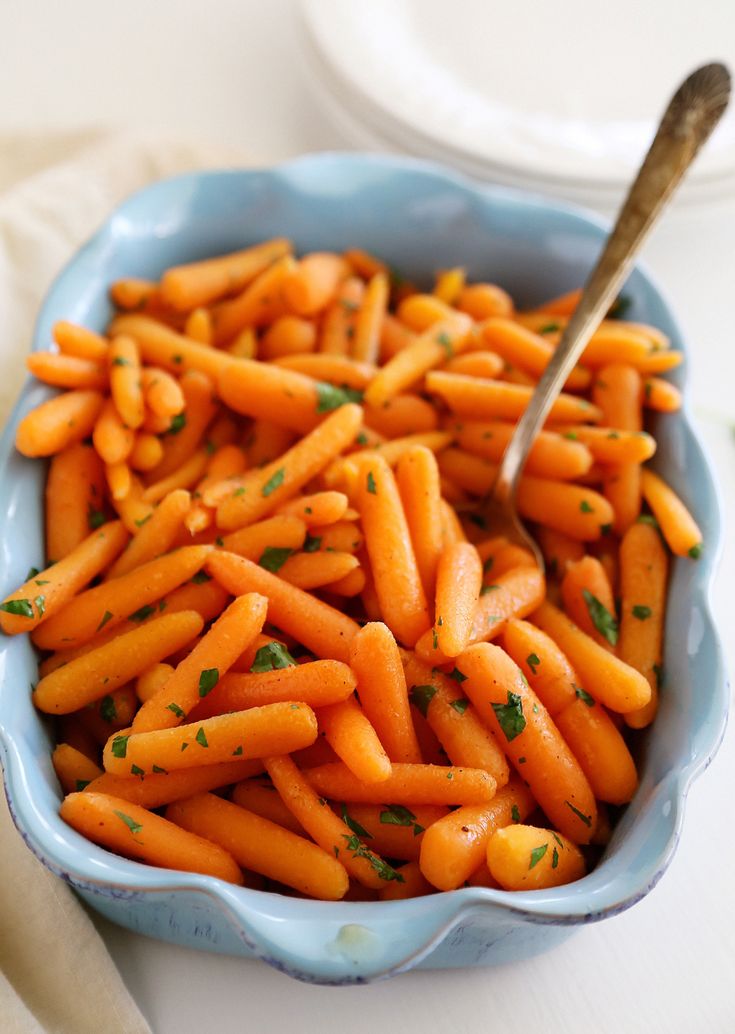 Line a baking tray with parchment paper.
Line a baking tray with parchment paper. - Trim the tops, peel, wash the carrots and slice them horizontally.
- Drizzle with olive oil so they soften while roasting and spread them in one line on the tray.
- Roast for about 30 minutes.
- Transfer the carrots to a blender, food processor or Vitamix and blend. Add water tablespoon by tablespoon until you reach the desired consistency.
How to feed carrot to baby?
Carrot baby food for 6 month old baby:
- Puree carrots - have a few spoons available. Place puree on a preloaded spoon in front of the baby so they can explore. Or place a tiny bit of puree on the tray so they can dip their finger and then lick it. The more we allow children to have control over their feeding the better their relationship with food will be.
- Mashed carrots for baby food - If you have already given your baby many different stage 1 purees and they are doing great with feeding then you can offer them mashed carrot which has a little bit more texture.
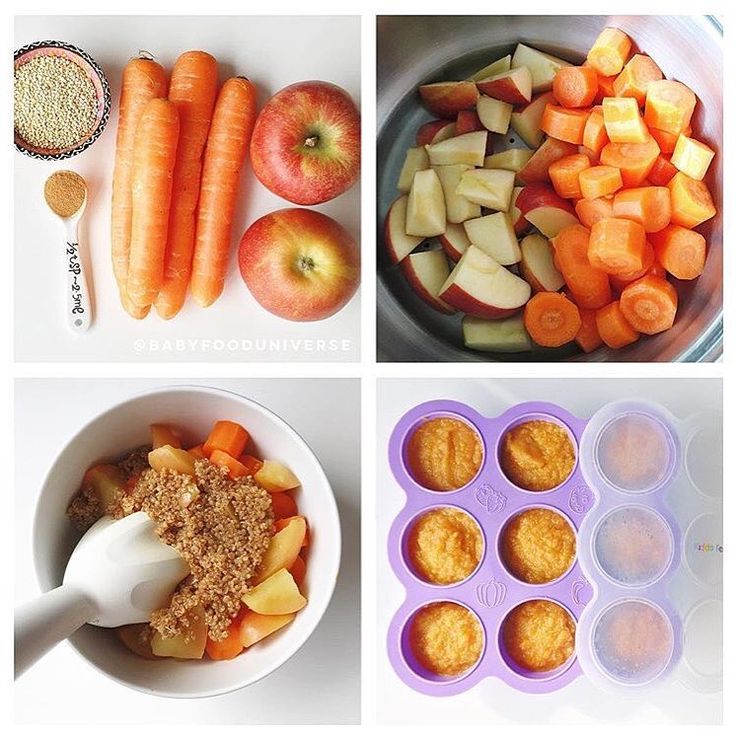 Follow either the boiling or steaming method and then mash the carrot with a fork. Give them a preloaded spoon or place a small amount in front of them.
Follow either the boiling or steaming method and then mash the carrot with a fork. Give them a preloaded spoon or place a small amount in front of them. - Baby-led weaning - using the boiling or steaming method make sure the carrots are cut in half horizontally and they are so soft that they can be mashed in between your fingers.
Baby food carrot for 9 month old baby+:
- Pincer grasp - this is a great time for your baby to try developing their pincer grasp skills so cut the boiled or steamed carrot into pieces the size of your fingernail and serve on the baby's plate or tray.
Carrot baby food storage
- Puree is best stored in airtight containers in the fridge. In freezer use ice cube trays or specific trays for baby puree like this one from Keedo Feedo.
- Store in fridge for 3 days and freezer for up to 6 months
- Thaw overnight in fridge in airtight container
- To serve remove it 2 hours in advance from the fridge so the puree reaches room temperature and then you don't have to reheat it
- Reheat in a small saucepan on the stove with a tsp of water
Baby allergy to carrots?
Carrots are not really classified as a common allergen but that doesn't mean someone cannot be allergic to carrots.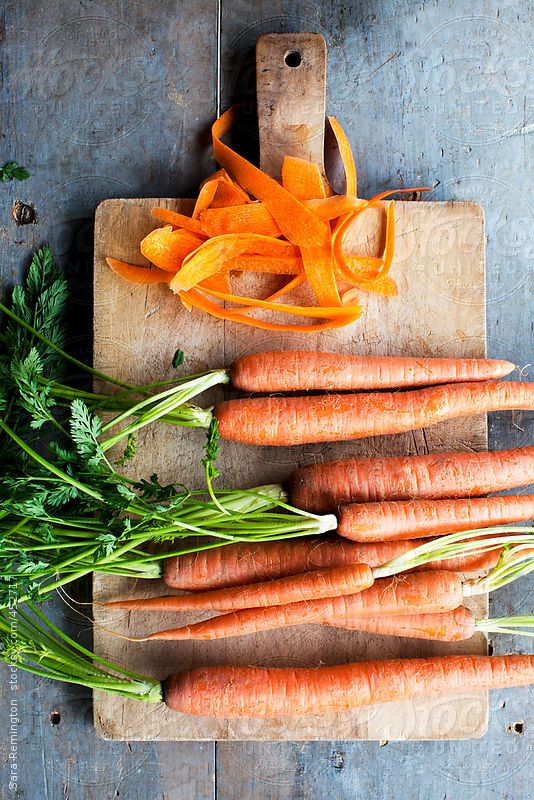 The good thing is that known carrot allergies haven't been shown as fatal and severe ones but rather manifest as an oral allergy mostly when a raw carrot is ingested.
The good thing is that known carrot allergies haven't been shown as fatal and severe ones but rather manifest as an oral allergy mostly when a raw carrot is ingested.
Main symptoms are itchiness of the mouth and/or throat and swelling of the mouth, tongue, or face. The bad thing here is that a small baby won't be able to tell you if they have an itch so it is very important to observe your baby each time a new food is offered (including carrots) and check for any unusual symptoms or behavior while eating.
If you notice that your baby is allergic, immediately remove all foods from their mouth and reach out to your doctor/pediatrician.
Carrot puree baby food combinations
If you are passed stage 1 baby puree and you want to make homemade baby food more exciting you can combine carrots with:
- Chicken
- Sweet Potato
- Pumpkin
- Butternut squash
- Apples
- Pears
- Peach
- Beef
- Chicken Butternut squash puree
- Zucchini Sweet Potato Puree
- Olive oil
- Cinnamon
- Nutmeg
- Curry powder
FAQ
Can carrots be given to babies?
Yes, carrots are a great first food for baby because they are a sweet vegetable with lots of vitamins. They can be given to babies from 4 months onwards. However most recommendations state that babies should start solid foods at 6 months old. See here more recipes for 6 month old baby.
They can be given to babies from 4 months onwards. However most recommendations state that babies should start solid foods at 6 months old. See here more recipes for 6 month old baby.
How to give carrots to babies?
You can either give as a carrot puree, mashed with a fork, very soft but in bigger chunks for baby-led weaning, or if your baby is ready for pincer grasp then cut into small pieces. All methods require carrots to be cooked until soft.
Can you puree raw carrots for baby?
No because they are a very hard vegetable so it is better to cook. Also, for younger babies their digestive system is not yet developed to be able to efficiently process raw carrots so eating raw ones (if they are at all able to) might lead to digestive problems like tummy ache or constipation.
Does carrot puree cause constipation in babies?
Carrots or carrot puree are not a known constipation-causing food since it does contain fiber but each body and digestive system reacts differently so constipation after eating carrot puree cannot be ruled out.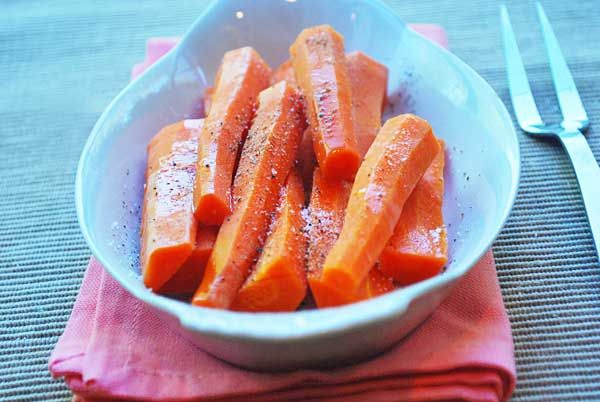 If you notice that your baby has trouble passing stool and is cramped after eating carrot puree than you might want to cut back on it for a few days and offer it alongside fiber-rich foods such as wholegrains or seeds.
If you notice that your baby has trouble passing stool and is cramped after eating carrot puree than you might want to cut back on it for a few days and offer it alongside fiber-rich foods such as wholegrains or seeds.
If you've tried this recipe for kids then rate the recipe below and leave us a comment!
More homemade baby food recipes you will enjoy
Puree Carrots for Baby Recipe
This puree carrots for baby recipe is a great stage 1 baby food recipe that can be made in 3 ways and served either as carrot puree, carrot mash and baby-led weaning for your 6 month old baby or older. Only 5 min prep.
5 from 4 votes
Author: Dora
Print Recipe Pin RecipePrep Time 2 mins
Cook Time 15 mins
Servings 6
Fridge Life? 3 days
Freezable? 3 months
- ▢
Small Blender optional
- ▢
Food Processor optional
- ▢
Vitamix optional
- ▢ 500 g carrots
- ▢ ¼ cup water
Method 1: How to steam carrots for puree?
Trim the tops, peel, wash the carrots and cut them into chunks.
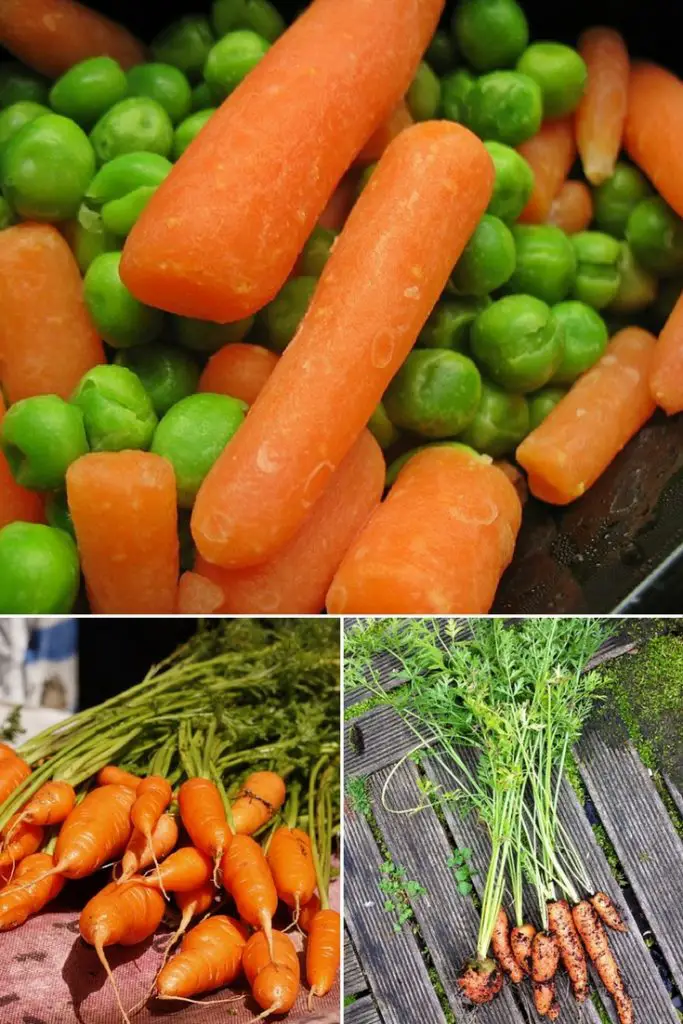 Place water in a saucepan. Once boiling place the carrots in a steamer basket on top, cover and steam for about 15 minutes until soft. Retain the water from steaming for the puree.
Place water in a saucepan. Once boiling place the carrots in a steamer basket on top, cover and steam for about 15 minutes until soft. Retain the water from steaming for the puree.Transfer the carrots to a blender, food processor or Vitamix and blend. Add water tablespoon by tablespoon until you reach the desired consistency
Method 2: How long to boil carrots for baby food?
Trim the tops, peel, wash the carrots and cut them into chunks. Place water in a saucepan. Once boiling add the carrots, cover, turn the heat to medium and cook for about 15 minutes until tender.
Transfer to a blender or food processor and blend. Add water tablespoon by tablespoon until you reach the desired consistency.
Method 3: Roasted carrot baby food
Preheat oven to 400°F / 200°C. Line a baking tray with parchment paper. Trim the tops, peel, wash the carrots and slice them horizontally. Drizzle with olive oil so they soften while roasting and spread them in one line on the tray.
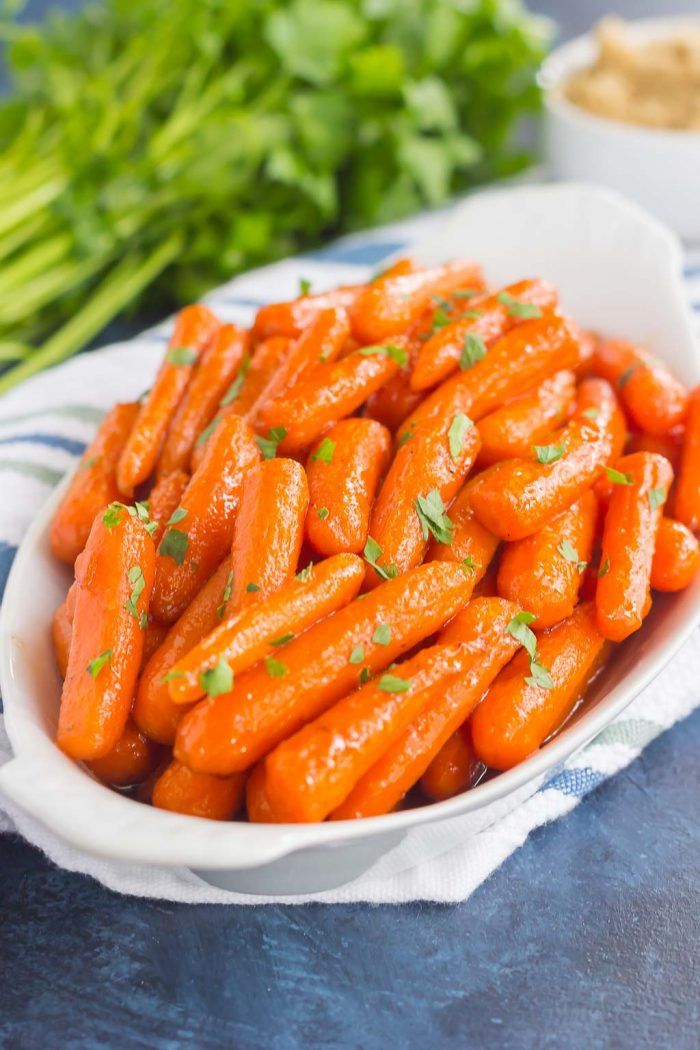 Roast for about 30 minutes.
Roast for about 30 minutes.Transfer to a blender or food processor and blend. Add water tablespoon by tablespoon until you reach the desired consistency.
Age: 4-6 months and up
Storage:
- Airtight containers in the fridge. In freezer use ice cube trays or specific trays for baby puree like this one from Keedo Feedo
- Store in fridge for 3 days and freezer for up to 6 months
- Thaw overnight in fridge in airtight container
- To serve remove it 2 hours in advance from the fridge so the puree reaches room temperature and then you don't have to reheat it
- Reheat in a small saucepan on the stove with a tsp of water
Baby-led weaning: to serve baby-led weaning use the boiling or steaming method but cut the carrots in half lengthwise and make sure they are so soft they can be mashed between your fingers before serving to the baby.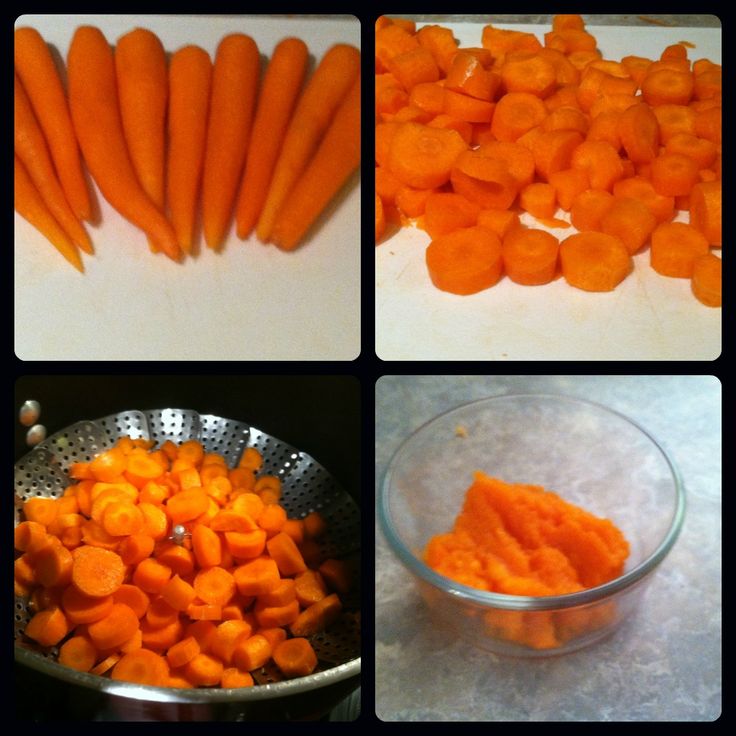
Serving: 1gCalories: 34kcalCarbohydrates: 8gProtein: 1gFat: 0.2gSaturated Fat: 0.03gPolyunsaturated Fat: 0.1gMonounsaturated Fat: 0.01gSodium: 58mgPotassium: 267mgFiber: 2gSugar: 4gVitamin A: 13922IUVitamin C: 5mgCalcium: 28mgIron: 0.3mg
Tried this recipe?Let us know how it was!
If you've tried this recipe for kids then rate the recipe below and leave us a comment!
Reader Interactions
How to Make Carrot Baby Food (Carrot Puree)
How to make carrot baby food by cooking and blending carrots into a smooth and creamy puree. Carrot puree make a great stage 1 starter food for babies.
A couple weeks ago I shared all about introducing solids to baby, my approach with Olivia and what foods we’d tried so far. Honestly, I had no intentions of sharing baby food recipes, but I’ve been having so much fun making it for Liv and everyone has seemed really interested so here we are.
For this first post, I thought I would share a simple recipe for an easy stage 1 food for babies 4 month and up, homemade carrot puree.
Like sweet potato and winter squash, carrot puree makes a great stage 1 food for babies because it can easily be pureed until thin. Carrots are also low on the allergy scale and easily digested by a tiny tummy.
Olivia’s first food was sweet potato puree and then avocado, but carrots came quickly after these two foods.
Homemade Baby Food
Let me start by saying that I know homemade baby food isn’t always an option and that’s okay. When we were on vacation I bought a couple baby food pouches for Olivia. She gobbled them up. That said, the majority of her food is homemade because I really enjoy cooking and making food for Liv has been really fun for me. I also like knowing that she’s eating fresh, nutrient-rich food that’s been made with love. That might sound corny, but it’s true.
When researching how to make homemade baby food I also researched how shelf-stable baby food is made.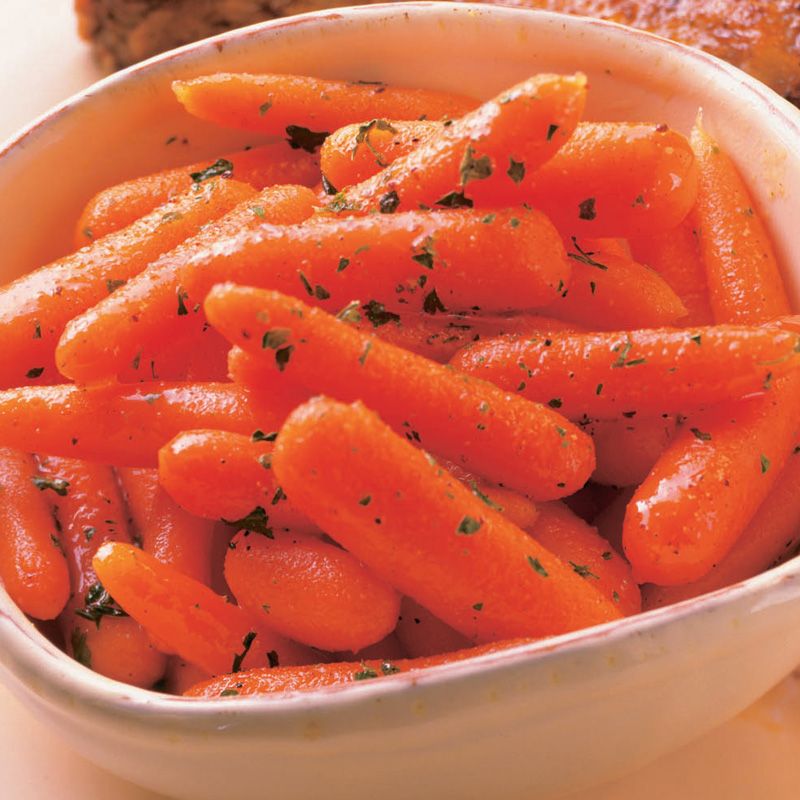 The shelf-life of jarred store-bought baby food is 2 years, which means you could be feeding your baby shelf-stable food that’s older than they are! Isn’t that wild to think about?!
The shelf-life of jarred store-bought baby food is 2 years, which means you could be feeding your baby shelf-stable food that’s older than they are! Isn’t that wild to think about?!
And while I haven’t tasted store-bought carrot baby food, I imagine that this homemade carrot puree tastes way better!
Carrot Nutrition for Infants
Carrots are a such a nutritious first food! They are high in beta-carotene, a red-orange antioxidant that converts to vitamin A in the body. Vitamin A is known to boost eye health and support the immune system. Carrots also contain vitamin C, iron, calcium and fiber, which can be helpful for normal bowel movements in babies.
What Kind of Carrots to Use
I like to use fresh, organic whole carrots. Just wash the carrots well and peel them before chopping and cooking. I know it’s an extra step, but I do recommend peeling them to remove any dirt particles and/or pesticide residue. I also think removing the peel of the carrots makes them taste better.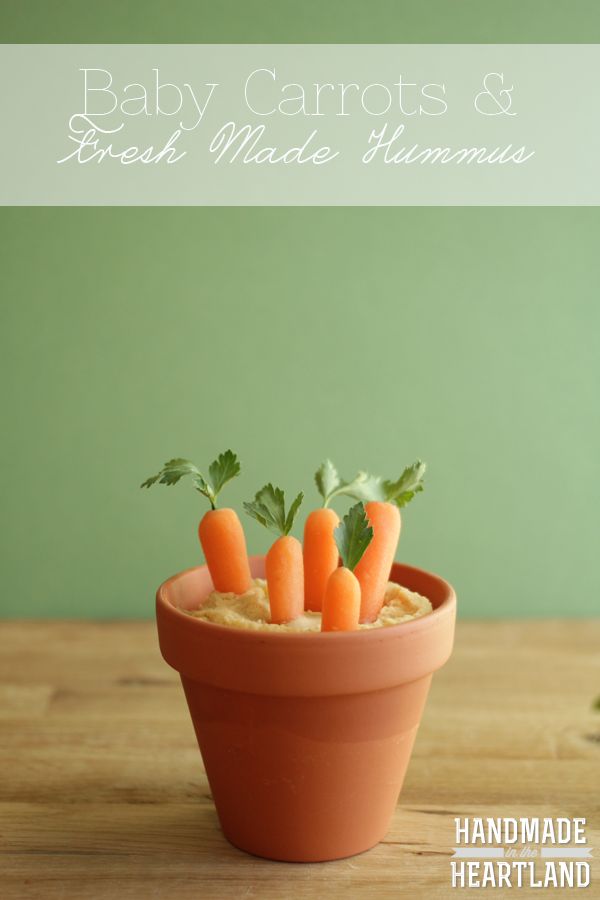 They taste super earthy to me when the peel is on. You can also use baby carrots, which makes the chopping process faster because they’ve already been peeled.
They taste super earthy to me when the peel is on. You can also use baby carrots, which makes the chopping process faster because they’ve already been peeled.
I personally like to buy organic foods for making homemade baby food, but also realize this isn’t an option for everyone so buy what you can afford.
How to Make Carrot Puree- Peel and chop carrots.
- Cook the carrot chunks by steaming, boiling or roasting.
- Transfer cooked carrots to a blender or food processor. I’ve been loving my Vitamix for blending up baby food. It gets the purees super smooth!
- Blend until smooth, adding breast milk, formula or water to thin – the carrot puree will likely be a bit too thick for stage 1 eaters without adding some sort of liquid to thin the puree. I like using breast milk or formula for extra nutrients, but you can use water as well (water used for the steaming or boiling process works great).
- Let carrot puree cool and serve right away or portion into storage containers or ice cube trays for later use.
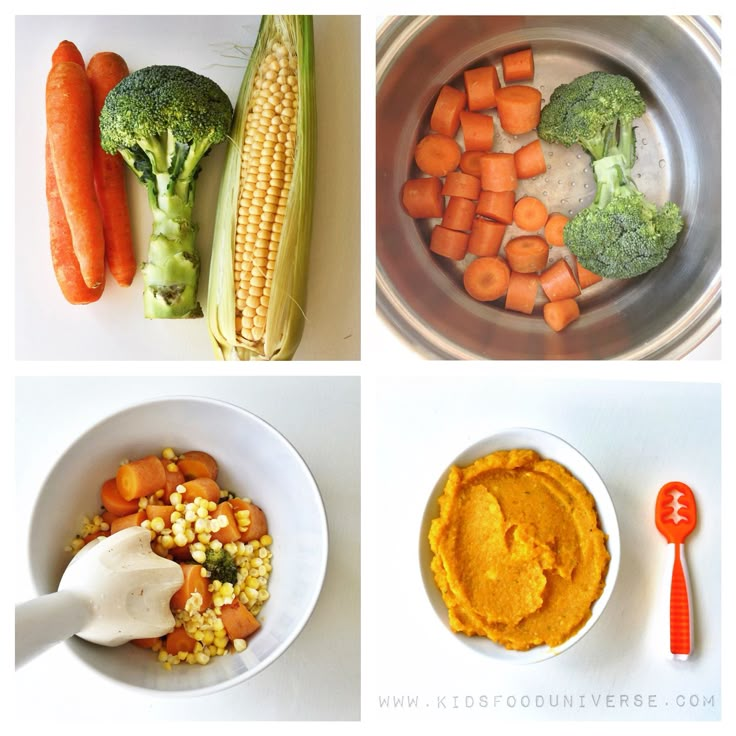
- Carrot puree an be stored in the fridge for 3 days or in the freezer for 3 months.
How to Store Carrot Baby Food
Once you have the carrot puree blended to the consistency you want, let the mixture cool and then transfer into BPA-free storage containers or into an ice cube tray. I’ve been using silicone ice cube trays and these 4 oz glass storage containers. The ice cube trays are great for younger babies who aren’t eating as much volume because you can defrost one cube at a time. While the 4 oz jars are great for older babies who are eating more than 1 oz at a time.
We had the ice cube trays on hand and I just recently bought the WeeSprout glass storage containers that are specifically for baby food. I like that they have measurements on the side of the jars and that they’re glass instead of plastic (no worry about BPA). They are also freezer, dish-washer and microwave-safe. Plus they come with colorful lids that you can write on with a dry eraser marker to note the item and date.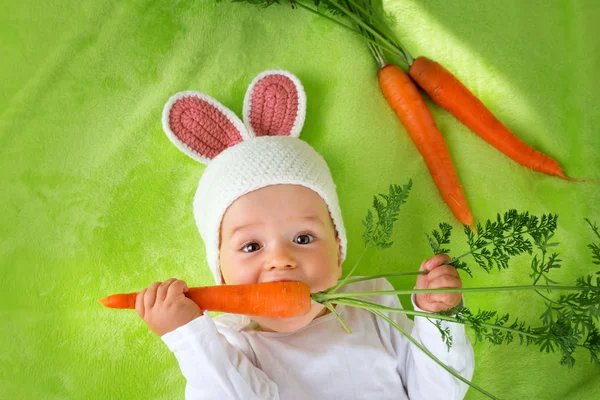
The fresh carrot puree will keep in the fridge for 3 days and in the freezer for up to 3 months.
Don’t Forget to Label
I highly recommend labeling any baby food you make before storing! It’s amazing how quickly you forget what day you prepped the food once it goes into the fridge or freezer. #mombrain
How to Reheat or Thaw Frozen Carrot Puree
To thaw frozen pureed carrots, I recommend taking the jar out of the freezer the night before you want to use it so it can defrost in the fridge overnight. If you need to use it right away, you can thaw it using a water bath. Some people will recommend microwaving the frozen puree using the defrost seating but I prefer these two methods:
- Defrost in the refrigerator: Place frozen puree cubes into a jar or baby’s serving dish, cover, and place in the refrigerator overnight. If you stored the puree in a jar or storage container, simply place the jar the fridge.
- Water bath: Place frozen pureed cubes in a small container and set in another larger container with warm water.
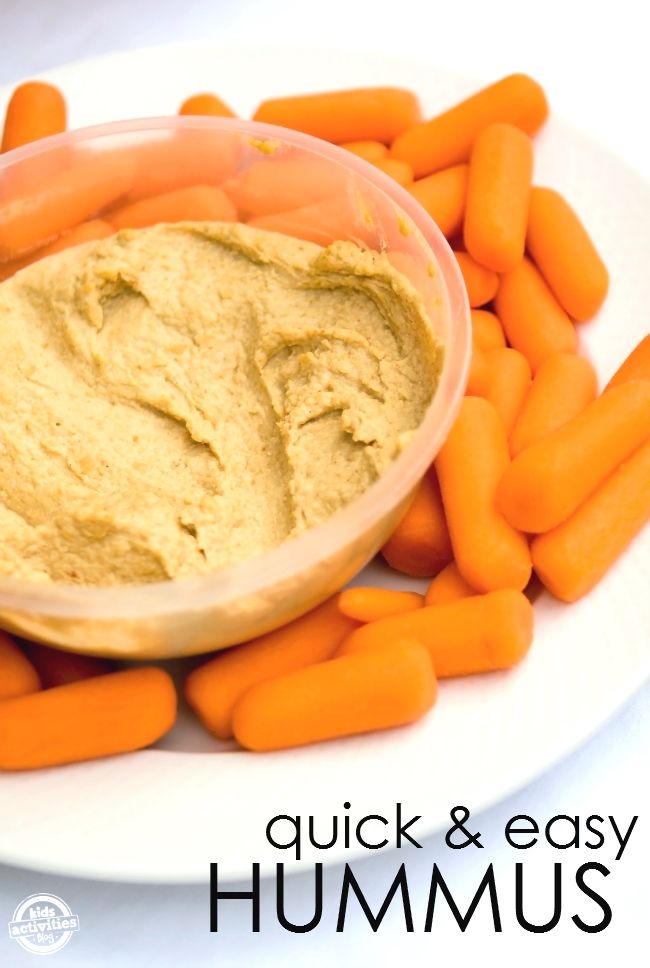 Replace the water as needed. Once defrosted, portion the food into individual bowls, cover, and refrigerate until serving.
Replace the water as needed. Once defrosted, portion the food into individual bowls, cover, and refrigerate until serving.
Be sure to use any of the defrosted food within 48 hours of being defrosted and do not re-freeze.
Baby Food Combinations with Carrots
Once your baby is ready for stage 2 foods that are combinations, you can blend different fruits and veggies into the carrot puree. Here are some ideas of foods and spices that pair well with carrots.
- Green veggies – peas, broccoli, green beans, zucchini, spinach
- Orange veggies – butternut squash, sweet potatoes
- Fruits – apples, peaches, pears
- Carbs – brown rice, lentils, quinoa
- Protein – beef, chicken
- Herbs and Spices – cinnamon, ginger, cardamom, cumin, paprika, nutmeg, curry, mint
More Baby Food Recipes and Resources
- Baby Oatmeal
- Introducing Solids to Baby
- 6 Baby Food Combinations (Stage 2)
- Sweet Potato Puree
- Avocado Puree
- Butternut Squash Puree
- Pea Puree
- Peach Baby Food
- Banana Puree
- Smash Cake
- Banana Pancakes For Babies
- Baby Yogurt Melts
Carrot Baby Food
4 from 39 votes
How to make carrot baby food by cooking and blending carrots into a smooth and creamy puree.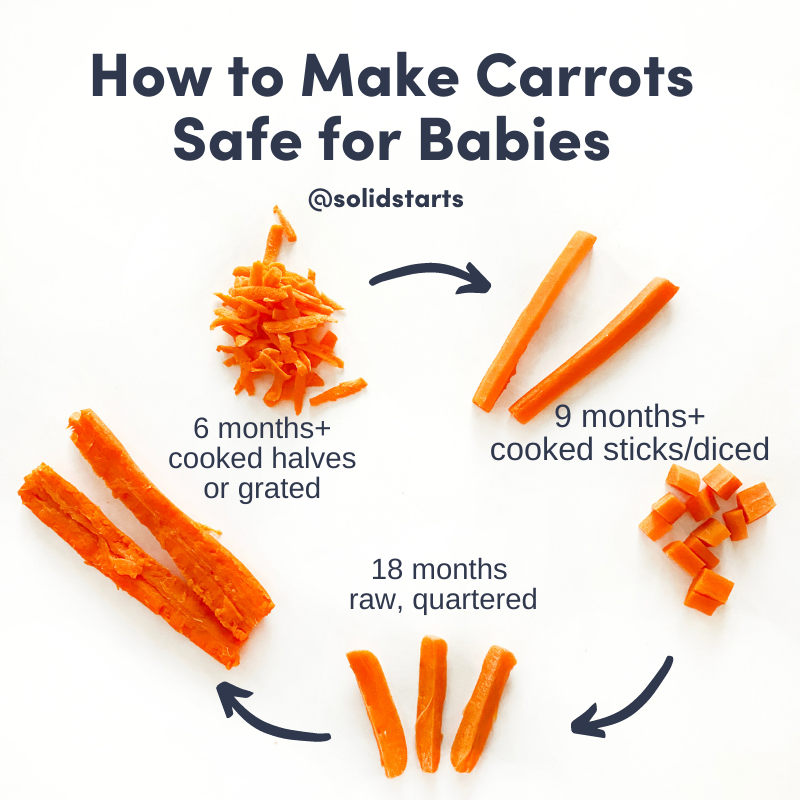 Carrot puree make a great stage 1 starter food for babies.
Carrot puree make a great stage 1 starter food for babies.
Print Recipe Pin Recipe
Prep Time 5 minutes
Cook Time 20 minutes
Total Time 25 minutes
Servings 12 oz
- 1 lb fresh organic carrots
- 1/4 – 1/2 cup breast milk, formula or water, to thin
- spices or herbs of choice, optional
Peel carrots and chop into chunks. Try to make the carrot chunks around the same size so they will finish cooking around the same time. The smaller the chunks, the faster they will cook.
Fill a pot with about 1 inch of water, add carrots to a steamer basket and place inside of the pot. Bring water to a low boil, cover with lid and steam carrots for 15-20 minutes, or until fork tender. The cook time will depend on the size of your carrots.
Once carrots are tender remove pot from heat and allow carrots to a cool a bit before transferring to a blender or food processor.
 Puree carrots in the blender or food processor, adding liquid (breast milk, formula or water) as needed to get the desired consistency. If using water, the water leftover from steaming or boiling the carrots works great.
Puree carrots in the blender or food processor, adding liquid (breast milk, formula or water) as needed to get the desired consistency. If using water, the water leftover from steaming or boiling the carrots works great.Transfer carrot puree into storage containers and store in the fridge for 3 days or freezer for 1 month.
- You can boil or roast the carrots instead of steaming. See my tips in the blog post above.
Serving: 4oz Calories: 62kcal Carbohydrates: 14g Protein: 2g Sodium: 116mg Fiber: 4g Sugar: 9g
Author: Brittany Mullins
Course: Side
Cuisine: Baby Food
Keyword: carrot baby food
DID YOU MAKE THIS RECIPE?
Please leave a comment and star rating on this post and share on social media using the hashtag #eatingbirdfood. I love seeing your recipe shares!90,000 children's carrot puree - a simple and tasty recipe with step -by -step photos- recipes
- Recipes for children
- Children's carrot puree
- We will need:
- Carrots 250g Show as large photos with description
Step 1
1
1.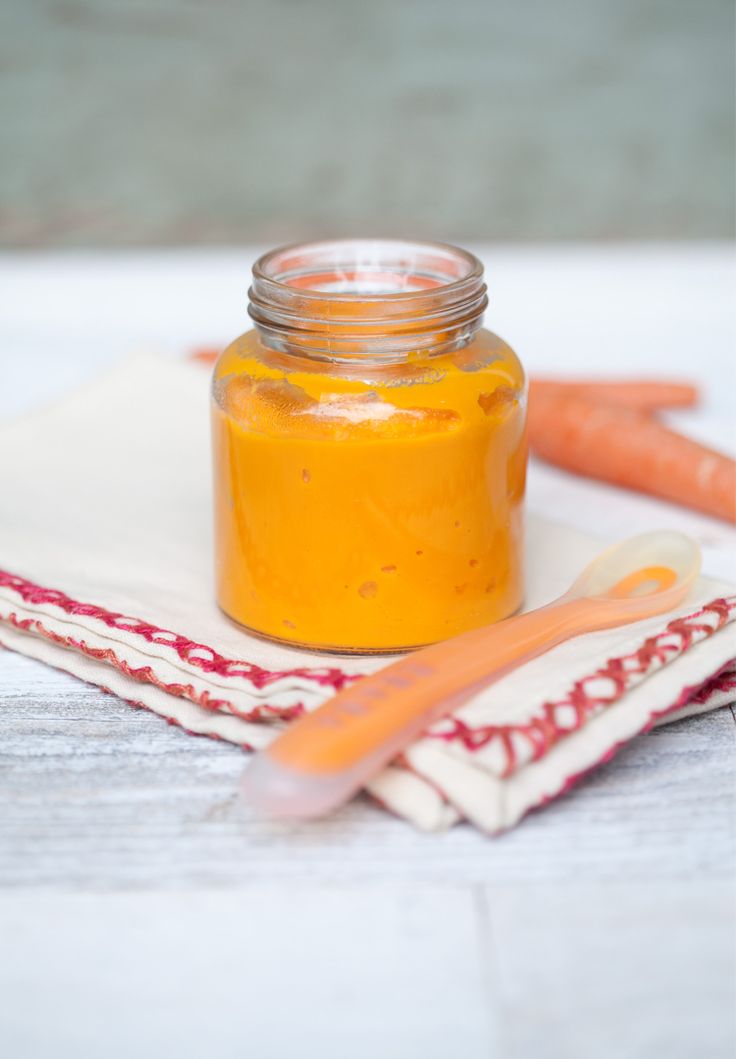 Take a young carrot.
Take a young carrot.
It is pre-washed and cleaned and cut into small cubes.
Step 2
2
2. Place the sliced carrots in boiling water and cook over low heat for 20-15 minutes until soft.
Tip
! Recommendation: Do not use sugar, salt and spices in children's meals.
Step 3
3
3. Pass the prepared vegetables through a sieve or puree with a masher, or with a blender.
Tip
! Recommendation: if you get a thick puree, you can add a decoction. Since the child will not be able to eat too thick mashed potatoes and not get comfortable in the body.
Step 4
4
4. Carefully inspect the cookware for cracks (this should not be used).
Wash with degreasing agents and rinse thoroughly under running water.
Pour water into the bottom of each jar in a layer of 1-1. 5 cm.
5 cm.
Turn on the microwave oven at maximum power (from 700 to 800 W and above, in this case, the time is simply reduced) for 3-5 minutes, depending on the volume of the container.
Using clean oven mitts, take out the hot dish and place it on the ironed cloth.
Tip
Sterilization involves the destruction of pathogenic microorganisms that may adversely affect the human body. On an industrial scale, this is achieved using high temperatures and pressures. At home, steam treatment is most often used. Warming dry cans in the oven is also used.
Recipe category: Recipes for children
Tags: puree, baby puree, carrot puree, vegetable dishes, healthy eating, vegetarian recipes, recipes for children
Similar recipes
Delicate mashed potatoes from Chef Bell Pepper Soup Vegetable puree soup Baby squash puree Irish Mash - Colcannon carrot waffles Fragrant vegetable soup Baby zucchini and pumpkin puree Zucchini puree soup Spinach mashed potatoes Aligo or mashed potatoes with cheese Carrot cream soupOther recipes in category "Recipes for children"
Oatmeal with pumpkin coffee marshmallow apple terrine Steamed lazy dumplings (in a slow cooker) Chicken muffins with cottage cheese and cheese Cottage cheese casserole with raisins and dried apricots Banana casserole in a slow cooker Cherry marmalade Homemade Adyghe cheese "Nests" of zucchini Baby squash puree Homemade milk sausages-
Multicooker recipes
-
Vegetarian recipes
-
Healthy eating
-
Recipes for children
-
Apple pastries and sweets
-
Salad recipes
-
First courses
-
Second courses
-
National dishes
-
Bakery products
-
Cakes and pastries
-
Desserts and sweets
-
Drinks
-
Preparations, pickles, jams
-
Sauces
-
Miscellaneous
Recipes for children
carrot puree for babies
Carrots rich in beta-carotene are a very important product in baby food.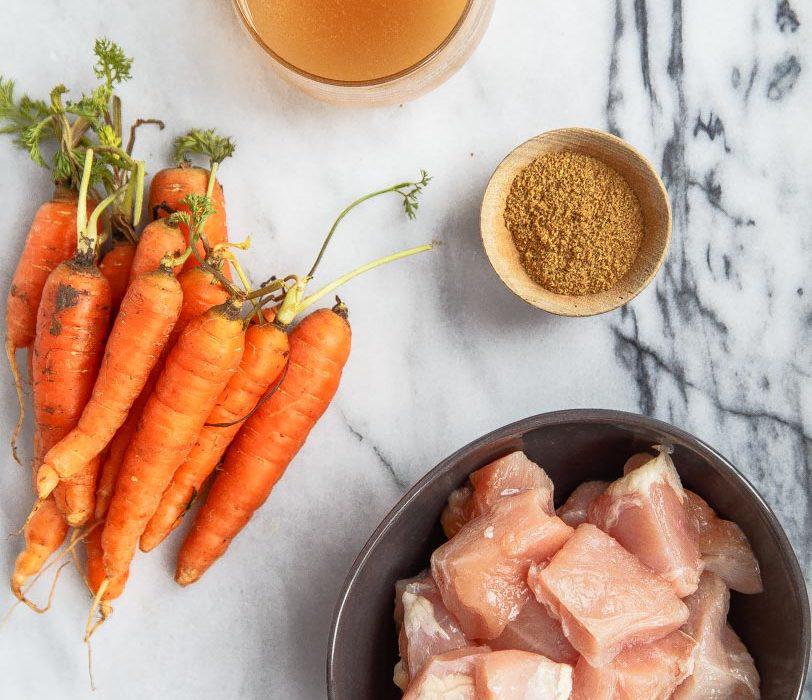 Follow our simple step-by-step guide to learn how to introduce carrots to your baby's diet and how to make baby carrot puree.
Follow our simple step-by-step guide to learn how to introduce carrots to your baby's diet and how to make baby carrot puree.
Before starting the preparation of carrot puree, let's figure out how many months you can introduce carrots into complementary foods. Do not rush and introduce carrots into complementary foods as one of the first vegetables, since an allergy to carrots in infants is possible. What vegetables are better to start with complementary foods, see the table of complementary foods.
However, from 7-8 months you can try to give a little carrot puree to the baby. Don't forget how to introduce complementary foods: start with a small dose (half a teaspoon of carrot puree is enough) in the morning meal so that during the day you can see if the child has an allergic reaction. With normal tolerance, gradually increase the serving.
Read also: Carrot vitamins for the whole family
Step 1: Choose and buy carrots
Look for carrots with a smooth surface and bright orange color.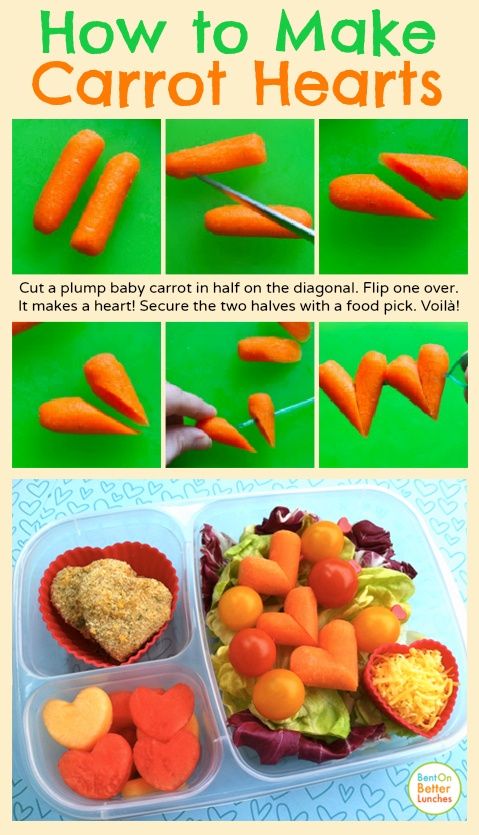 The root crop should be of natural shape, without bends. Do not buy carrots with a blackened top - it indicates that the vegetable is stale.
The root crop should be of natural shape, without bends. Do not buy carrots with a blackened top - it indicates that the vegetable is stale.
Step 2: Wash and prepare the carrots for cooking
Wash the carrots under cold running water. If you're worried about nitrates, you can soak it for 2 hours in cold water. Clean and remove greens. Cut the carrot into small pieces.
Read also: 10 Myths and Facts About Nitrates in Homemade Baby Food
Step 3: Cook the Carrots
Pour water into a medium saucepan, place over heat and bring water to a boil. Reduce heat and simmer carrots until soft. How much to cook carrots for feeding? Approximately 10-15 minutes. Drain and rinse the carrots in cold water for three minutes to stop the cooking process.
Step 4: Puree carrots
Puree the carrots in a food processor or blender until smooth. Add water as needed to achieve desired consistency. After your baby is ready for more solid foods, usually around 10 months old, instead of mashing the carrots, you can cut them into pieces.
After your baby is ready for more solid foods, usually around 10 months old, instead of mashing the carrots, you can cut them into pieces.
Step 5: What goes best with carrot puree
Carrot puree is delicious on its own or paired with other vegetables, fruits, meat and fish. After the child has mastered the monocomponent vegetable puree, you can mix carrots with various fruits, other vegetables, meat or fish.
Try combining carrot puree with:
- broccoli:
- green beans;
- peach;
- zucchini;
- sweet potatoes;
- brown rice;
- lentils;
- veal;
- chicken.
Try our recipes for fish puree with carrots or vegetable puree with broccoli and cheese containing carrots or carrot puree with chicken, peppers and sweet potatoes.
Step 6: Freeze the carrot puree
Leftover carrot puree can be refrigerated and stored in a special container in the refrigerator for up to 3 days.